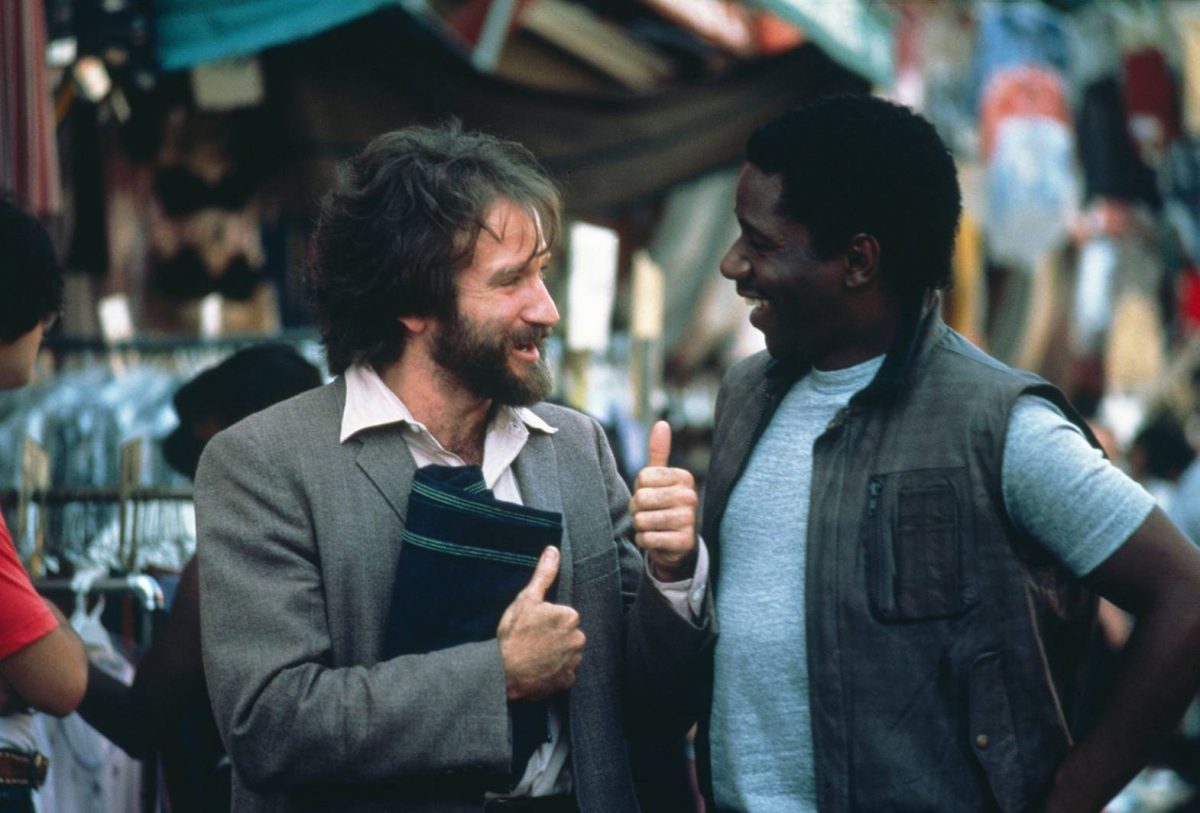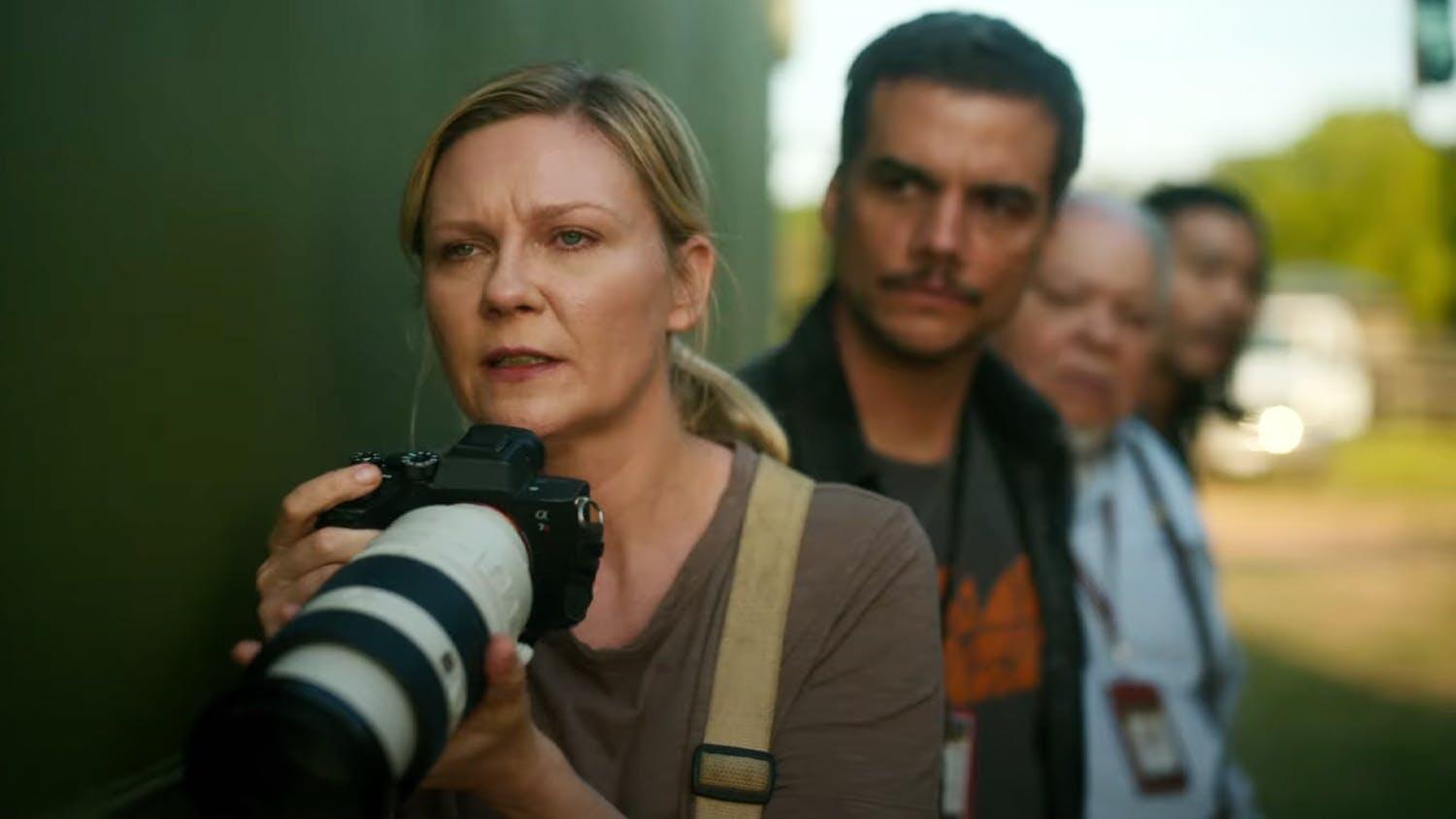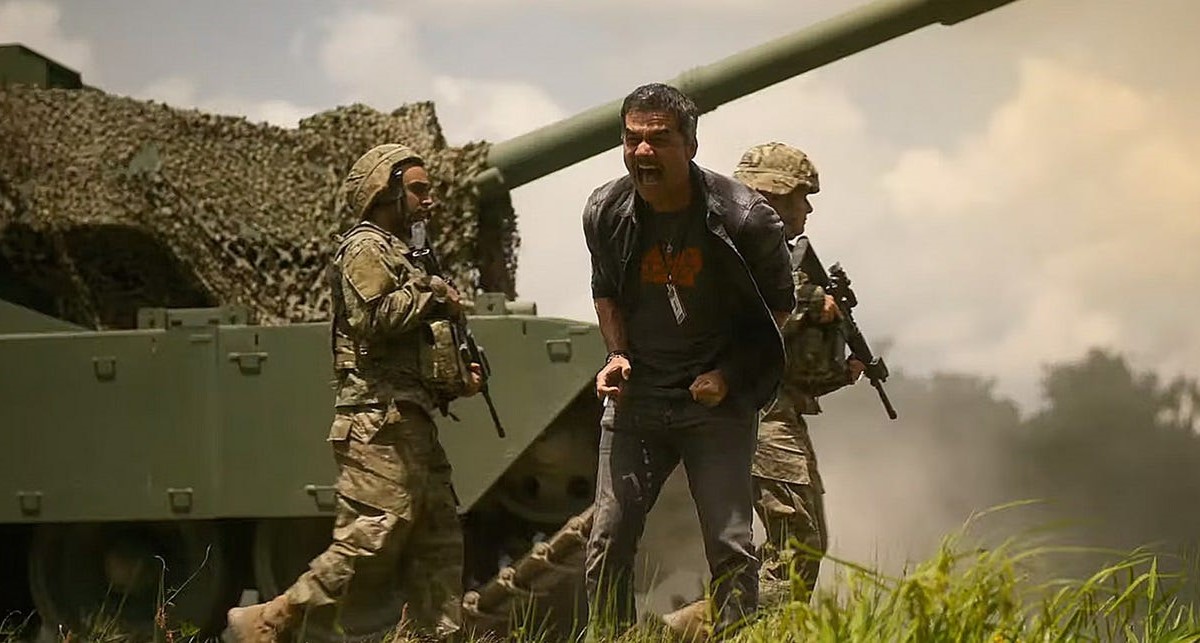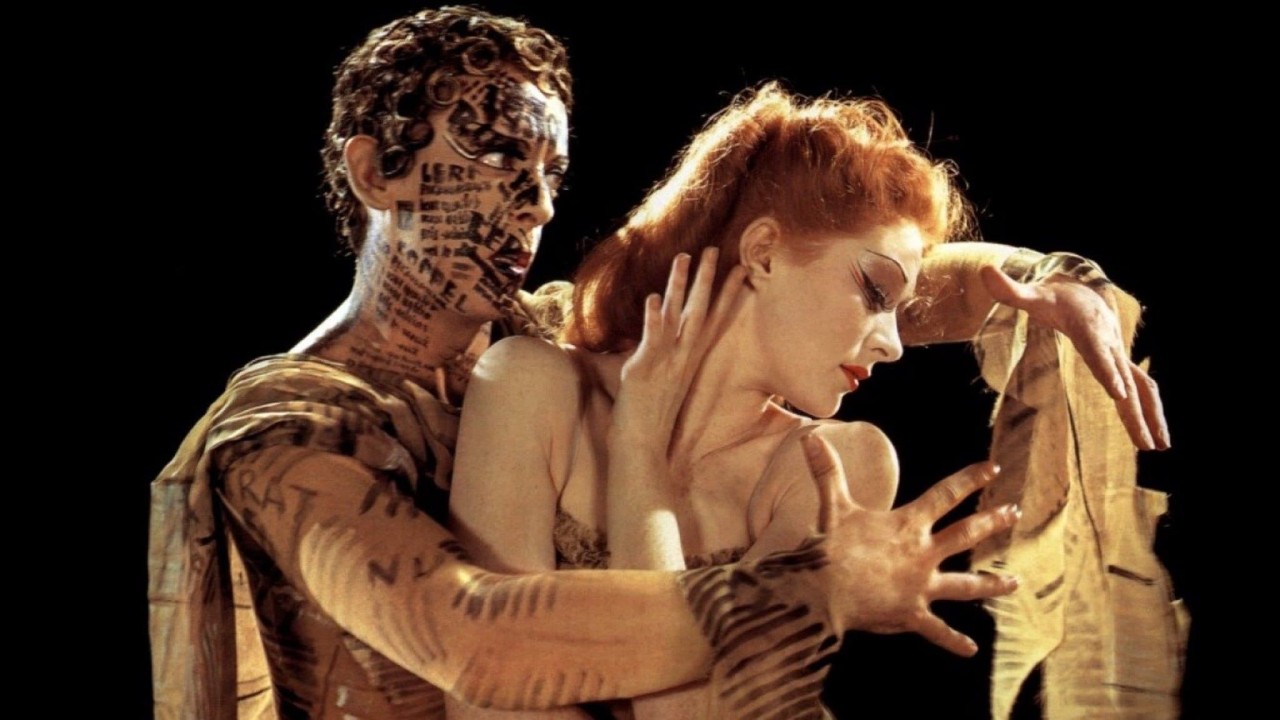Circus
by Pauline Kael
A documentary shown on television a few years ago—Vladimir Rifs When I Think of Russia—ended with two transplanted artists, Baryshnikov and the poet Joseph Brodsky, talking together late at night at a party; they were probably a little drunk and definitely very sad, and what came across was the bond between them. They knew they’d never get over their sense of loss. I didn’t think a regular movie—a movie with actors—could communicate the emotions of Russian expatriates in the way that this glimpse did, but I was wrong. Paul Mazursky’s Moscow on the Hudson does it. Mazursky has hit on just the way to go about it: with Robin Williams as his Russian saxophonist hero, he has made a comedy about a tragedy—about going away forever, about not being able to go home.
In the first part (which is in Russian, with subtitles), the sax player, the bearded Vladimir Ivanoff, who worships American jazz musicians, goes through his daily grind in Russia. He has a job in a circus band, lives among three generations of his family in a one-room apartment, and has to arrange to use a friend’s place when he wants to be alone with his girl, who, before going to bed with him, hounds him to join the Party. Vladimir queues up automatically whenever he sees a line in front of a shop; he queues up even if it makes him late for rehearsals and he has to use half of whatever he’s bought as a bribe, so that Boris, the K.G.B. man who supervises the circus, won’t penalize him.
When Vladimir meets a friend who was a teacher before being sent to a mental hospital and now works paving streets, the friend asks, “Are you still with your music?” Vladimir says, “Still playing for tigers and bears.” But he and the other band musicians love their instruments; you can see it in the way they hold them as they march, in close formation. (During a break, they sit close together, eating oranges.) Vladimir is a rumpled, uncomplaining survivor, accustomed to the endless lying and spying and toadying. He’s also used to the temperamental outbursts of his friend Anatoly (Elya Baskin), the circus clown; Anatoly, who has the face of a clown even when he takes off his makeup, dramatizes his suffering—he cries out, “I hate my life!” Vladimir, who addresses his friend, with great courtliness, as “my dear clown,” understands his emotion, but when Anatoly says that he has got to have his freedom and is going to defect when the troupe performs in New York, Vladimir doesn’t want to take him seriously.
We know that Vladimir himself is going to defect, because the story is told as a flashback. In the opening scene, he’s on a New York City bus giving directions to a Frenchman and saying, “It’s pretty tough getting around here at first,” with the look of satisfaction of someone who has mastered the bus routes. But we don’t know how or why this fellow who loves his family (and adores his grandfather) will do it. By the time it happens—during the half hour that the circus troupe is given to shop in Bloomingdale’s, on the way to the airport and home—we know Vladimir so well that it seems natural and inevitable. What makes him love his family deeply is what makes him lose them forever. Vladimir embodies the Russian tradition of the holy fool. His passivity is deceptive; he has inner strength—he can’t help feeling the truth. Given an opportunity to say no to the K.G.B., he can’t resist it; he can’t not defect.
Bloomingdale’s—no more than a bit player in The Electric Horseman, where the store’s name was used for a gag—is a star in both Splash and Moscow on the Hudson. Mazursky uses it as the hub of the New York world, and the plot radiates from this temple of the mouthwatering temptations of capitalist decadence. The script (by Mazursky and Leon Capetanos) is slyly and gracefully designed so that the people Vladimir encounters in the store during the dizzying few minutes it takes him to escape from the control of the K.G.B.—people whom we at first assume to be minor players—become the most important people in his new life. Vlad (as these Americans call him) walks into this capitalist cornucopia and finds friendship and love. A black security guard (Cleavant Derricks) protects him from the K.G.B. “You’re in my jurisdiction,” the guard tells the Soviet agents—the workers at Bloomingdale’s talk about it as if it were a country. And when matters are settled the guard, who has offered to put Vlad up, takes him home to Harlem, where three generations of his family live together. A shark-faced Cuban immigration lawyer (Alejandro Rey), who happens to be shopping in the store during the defection, leaves his card. And Lucia (Maria Conchita Alonso), an Italian girl who works in the perfume department, becomes Vlad’s steady date. Yet it doesn’t take long before he discovers the isolation and paranoia of living in New York. The brutality of the city confuses him; in Russia, he says, he knew who the enemy was.
Nobody in New York wastes time offering Vlad sympathy, because there’s nothing unusual about his plight. Perhaps the sneakiest, most original aspect of the movie is that just about everyone Vlad meets, except some of the black people, is foreign-born (or an out-of-towner). He starts as a busboy, hustles his way from one crummy street vender’s job to another, drives a taxi, chauffeurs a limo; he studies English, saves enough money to buy a sax in a secondhand shop, and acquires an apartment in the East Village. And all this time he’s surrounded by Puerto Ricans, Lebanese, Haitians, Iranians, Brazilians, Cubans, Vietnamese—every variety of Hispanic, Asian, and European. These “ethnics” are in the service jobs that white native Americans have scrambled out of, and they’re on the streets hustling alongside him. They talk English mixed with their own languages, their lips twisting over the syllables in different ways. (“When you speak English, does your mouth hurt?” Vlad asks another immigrant.) He builds a new, makeshift family out of this disparate group, but it can’t fill the void created by what he left behind. (The Russia of this movie is a country where the grandfathers look like Harpo Marx.)
Paul Mazursky’s distinctive funky lyricism is in the scene with Vlad outside Bloomingdale’s waving goodbye to the circus troupe in the chartered Liberty Lines bus that’s taking them to the airport; he already knows that he has cut himself off from his own life. (And from then on there may be some extra moisture in his shining eyes when he laughs, or a smile will end a little abruptly.) The lyricism is in the way Vlad tries to dance American style; it’s in the double joke of his pleasure at the first joke he makes in English. It’s in the Old World politeness of his manner as he talks to an F.B.I. man, and in the courtesy he extends to a gay, whom he smiles at, taking him for another F.B.I. man. And it’s in the delicacy of the scene in which a newly arrived legal émigré—a Russian Jewish young man, very shy and looking a bit like Kafka—brings Vlad a letter from his family. It’s the magical element in some parts of the movie. You may be saying to yourself, “This scene shouldn’t work, it can’t work,” while you’re laughing because it’s working. That happens when Vlad and Lucia are in the bathtub eating mu shu pork and fooling around while she studies for her naturalization exam and recites the Bill of Rights. And it happens again in the naturalization ceremony.
The film wins your good will by its comic rhythms (especially in the first half). It’s shaped so that when the band, in New York, strikes up the circus march you’re eager for both the circus and the escape, and then you’re in Bloomingdale’s (what a place to get lost in!), which turns out to be another circus. And Mazursky’s instinct was really working for him when he paired Robin Williams with Maria Conchita Alonso, a Venezuelan beauty who’s an unself-conscious cutup, like the young Sophia Loren, and has a glorious, full-choppered grin. Her Lucia is outgoing, independent, sunshiny; she has come to this country to make something of herself—she would like to be a newscaster. Robin Williams’ Vlad is an anonymous Soviet man hoping for the creature comforts of a home and a family—a supplicant always. The bathtub scene, in which Lucia leans back against his furry chest while his furry arms enclose her, is physical in a way that disposes of the steam-house contortions of the lovers in Against All Odds. These two suggest real people.
That’s the plain, open secret of what makes this movie so pleasurable: you get to know the people in it, and Mazursky shows you how normal it is to be a little crazy. (Alejandro Rey’s Cuban, who seems to be gleaming with predatory intentions, turns out to be a decent fellow who has oversold himself on the natty Latin look.) In spirit, Moscow on the Hudson is like a more imaginative Harry & Tonto, with a mellowed style; Mazursky has become a far more skillful filmmaker, and his cinematographer, Don McAlpine, and the rest of his team help to give the picture a textured simplicity that is rare in a comedy. When you actually see Mazursky (he plays a tourist called Dave basking on a Florida beach and complaining about the rotten service at the hotel), he gives the film a manic zap—a heightened comic tension—that the other scenes don’t have. What they do have is a smoothness—a relaxed appreciation of what the performers are doing, as if Mazursky were as surprised and exhilarated as you are.
Vlad is the most Chaplinesque of Mazursky’s heroes. The term is often used as a putdown, but this film provides a reminder of the good side of Chaplin. There’s nothing wrong with suggesting an ordinary reasonable man who doesn’t want to cause any trouble, as long as he isn’t pathetic about it, and Vlad doesn’t slip into that—not even in the scene in Russia where he plays his sax for the circus animals, and definitely not in the scene in the East Village where he goes on playing despite the complaints of a neighbor but retreats farther and farther into his apartment and winds up in the water closet. Robin Williams’ Vlad is sturdy and resourceful—that’s what’s touching about him. Robin Williams was extraordinary in his last picture (Michael Ritchie’s The Survivors), and he gets better and better. He isn’t a comic “doing” a Russian; he just plays a Russian, and it’s as if he’d been born one. (I could have been fooled if I hadn’t seen him before.) He has nothing of the pixillated Mork about him; his Russianized pronunciation of American names is just funny enough, and when he cries it’s Russian style, starting around the mouth.
A few scenes are poorly acted—one in an Immigration office with a noisy black woman officer, and several involving Boris, the K.G.B. man, who’s much too coyly aware of being a comic bad guy, and who turns up for a final hammy bow when we’d thought we were rid of him. There’s also a misconceived scene—Vlad, alone and drunk, having a vision of his grandfather capering on the street. And one sequence seems truncated: when Vlad gets to sit in with the black saxophonist he idolized from records back in Russia the film cuts from their playing together to a scene of Vlad’s despair afterward—presumably because his idol had not been enthusiastic about his work. We really need to get a sense of what the man told him; the way it is, we can’t gauge if Vlad is over-reacting or if his playing is too derivative and his idol made that clear to him. These weaknesses are minor; the only larger one is the faltering of the film’s rhythm (though not its mood) in the last third. Mazursky seems to need several things going on at once (as in that bathtub), and offhand, peripheral jokes, too. When Vlad and Lucia quarrel and the black friend goes to Alabama for a time, Mazursky doesn’t have enough elements to juggle. Vlad trots around by himself and visits people, and a few scenes feel insecure, as if nothing’s going on.
In terms of what this comedy offers, this, too, is minor. What counts is that it tackles a wonderful subject without preening, and brings it off unassertively—so unassertively that the movie is in danger of being overlooked. (Variety has already dismissed it as something “for a very limited audience.’’) We’re getting to the point where the press assumes that movie audiences won’t be willing to bring anything to a picture, and warns them off. This is a movie in which you are expected to understand the hero when he tries to explain the difference between being unhappy in New York and in his homeland. “In Russia,” he says, “I did not love my life but I loved my misery, because it was mine.” Those who respond to his words may, I think, love this picture as much as I do. Back in Russia, Vlad waited in line and bought two pairs of shoes (the wrong size but the only size) and gave one pair to the K.G.B.; in New York, he buys flashy red, yellow, and white shoes that look like part of a pimp’s ensemble, and when Lucia objects to them he points out, “They were made in Italy.” It’s a one-world circus.
New Yorker, April 16, 1984
Also in Pauline Kael, State of the Art, 1985






1 thought on “Moscow on the Hudson (1984) – Review by Pauline Kael”
Day of the Locust (1975).